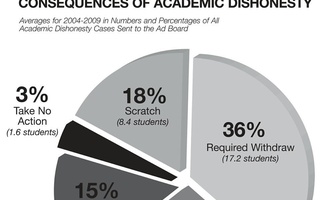The Administrative Board, the disciplinary arm of the College, has announced that it is reaping the benefits of new its new policies regarding plagiarism. The board recently released the number of academic dishonesty cases they saw in the 2010-11 school year, 272, a nearly 150 percent increase from the previous years. John L. Ellison, Secretary of the Ad Board, attributed the increase to newly instated policies regarding the punishments that the board can enforce in response to plagiarism. The policies allow for more leeway in judging cases and provide for penalties that vary in seriousness with the crimes they are made to address.
We applaud the changes, which provide a much-needed reevaluation of University policy toward plagiarism and academic dishonesty. In today’s world, academic dishonesty is becoming increasingly difficult to define, and increasingly in terms of severity. The fact of the matter is that certain infractions are worse than others, and punishing all cases of academic dishonesty alike necessitates a system in which the rules are either draconian or too lax to fit a sizable portion of the cases. For the Ad Board to switch to a system that allows for a variation in severity, not just in crimes but also in punishments, is a welcome sign.
It appears that professors likewise appreciate the change, as Ellison remarked that the increase in cases reported likely results from the professors no longer fearing to send a student to the Ad Board. This is a positive change for a number of reasons, not the least of which being that it guarantees the student a fair trial. A situation in which the professors are unwilling to report infractions by the students for fear of meting out too harsh of a punishment is not only a strong sign that something is the matter with the system, but also can result in an unfair response; the professor acts as arresting officer, judge and jury. Furthermore, such an unwillingness to report instances of academic dishonesty keeps the school in the dark about how actually pervasive (or not) such a problem really is, hindering their ability to adequately respond to it.
Switching away from the older system also has the advantage of giving students a more clear idea of how proceedings with the Ad Board work. Rather than simply believing that being sent to the Ad Board always results, through some opaque and unknowable process, in being asked to take a semester-long leave of absence, students now, through the gradations of the penalties being handed down, are given a more clear view of the process and logic behind the Ad Board’s decisions. That being said, many students still find the process confusing and inadequately explained. The resources to understand it are available; We would suggest that those people refer to the Ad Board’s website, or ask their tutor or proctor for more information about the board.
Read more in Opinion
Obama’s Covers AlbumRecommended Articles
-
 Ad Board Grapples with Plagiarism
Ad Board Grapples with Plagiarism -
Administrative Board Disciplinary Cases Increase By 150%The Secretary of the Ad Board attributes the increase to a year-old reform which has encouraged professors and students to turn in more students for academic dishonesty.
-
CUE Meeting Talks IntegrityCourse websites and House tutors could become new weapons in Harvard’s fight against academic dishonesty if ideas discussed at Wednesday’s Committee on Undergraduate Education meeting are turned into policy.
-
Delineating DishonestyThe definition of collaboration has become increasingly nebulous, and the difference between acceptable and unacceptable collaboration even more so.
-
Ad Board Reform of 2010 Led to More Options, More Dishonesty CasesDue to a change approved by the Faculty of Arts and Sciences in May 2010, the Ad Board has additional, arguably less severe, ways to punish students which it may use for anyone found guilty of illicit collaboration in Government 1310.
-
Ad Board's Educational Mission Under ScrutinyThis fall, some of the roughly 125 students accused of improperly collaborating in Government 1310: “Introduction to Congress” will likely be forced to take a year off from school, a punishment that some say will dog them long after their undergraduate years but teach them nothing about appropriate academic practices.













